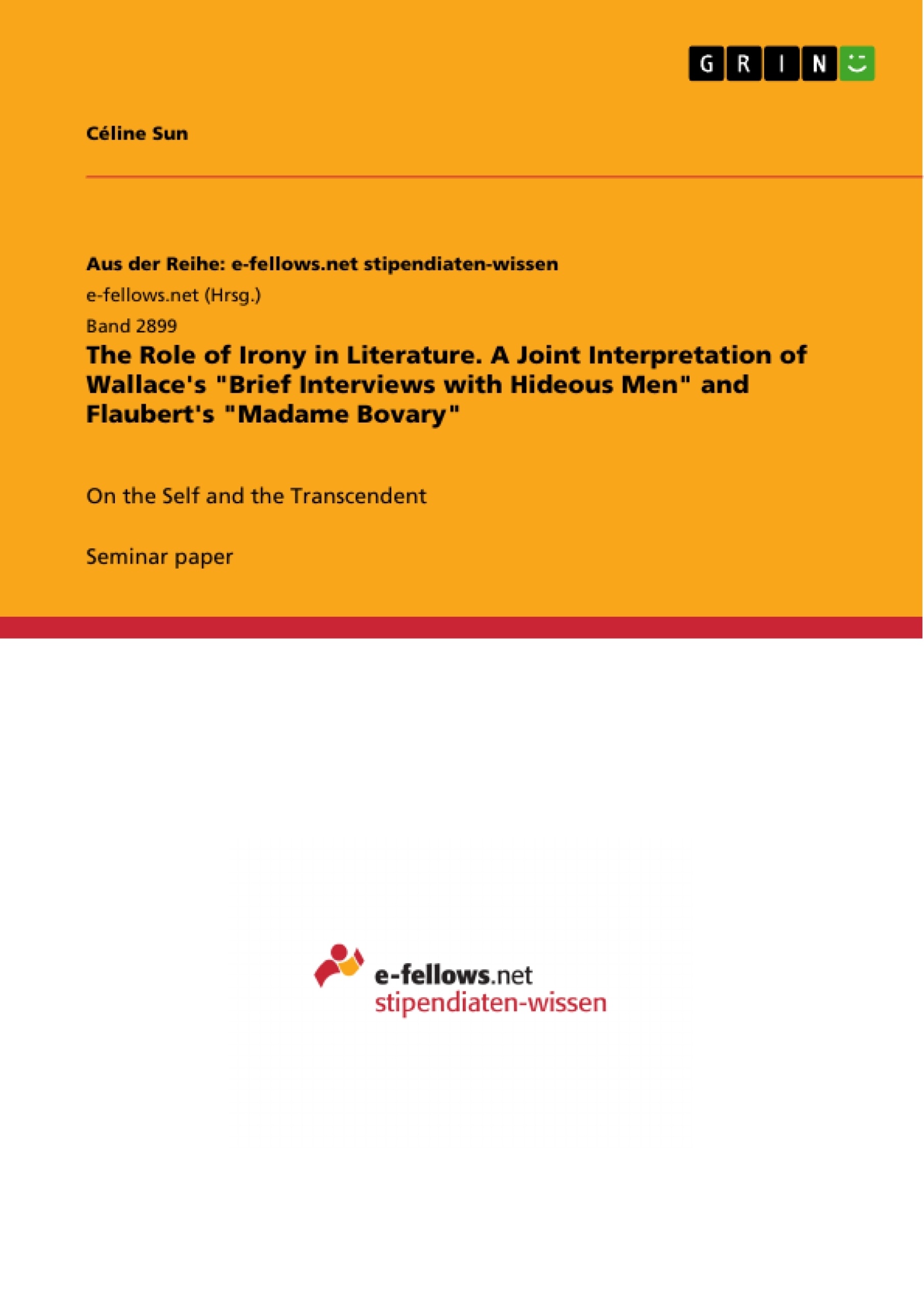By drawing on an existing study on existentialist engagement in David Foster Wallace’s œuvre to make a connection to "Madame Bovary", this essay will argue for and examine the similarity of the problems illuminated in the two works as they both deal with the relation between the sense of self and the acknowledgment of a transcendent reality. The focus will be on "Madame Bovary". At first sight, the ironic character of "Madame Bovary" appears to be susceptible to Wallace’s criticism of irony. I will show that, despite his use of irony, Flaubert is ultimately as committed to recognizing a transcendent reality through his writing.
Gustave Flaubert’s "Madame Bovary" and David Foster Wallace’s "Brief Interviews with Hideous Men" were written nearly 150 years apart. Flaubert, on the one hand, is often categorized within the tradition of realism – a label that he himself rejected – which followed a literary period of romanticism. On the other hand, Wallace, as a contemporary writer, enters a stage that is dominated by postmodern thinking. Both their writings are shaped by their critical engagement with the literary movement and social reality of their time and the protagonists of their writings are created as prototypes of the mind-set they seek to criticize through literary reflection.
Due to the differences in their literary context, however, it seems natural to assume that the two writers have very different literary agendas. Flaubert appears to propose through his writings a radical dissociation in face of and opposition to both the escapist tendencies of romantic novels and the reality of bourgeois society of his time, whereas Wallace criticizes the exact tendency of ironic dissociation as they have become rife in post-modern literature.
Inhaltsverzeichnis (Table of Contents)
- I. Introduction
- II. The Self
- III. Solipsism
- a. Self-reflection
- b. Experiential Mediated-ness
- IV. Subjectivity
- Erasure of the Other
- Lack and Loss of Self
- a.
- b.
- V. Transcendence
- a. Irony
- b. Impersonality
- C. Truth
- VI. Conclusion
Zielsetzung und Themenschwerpunkte (Objectives and Key Themes)
This essay aims to explore the similarities between Gustave Flaubert's Madame Bovary and David Foster Wallace's Brief Interviews with Hideous Men, both of which deal with the relationship between the sense of self and the acknowledgment of a transcendent reality.
- The nature of self and its construction
- The role of solipsism and self-reflection in shaping individual perception
- The impact of mediated experience on self-awareness
- The potential for irony as a tool to engage with transcendence
- The consequences of subjective experience on understanding reality
Zusammenfassung der Kapitel (Chapter Summaries)
The introduction sets the stage for the analysis, highlighting the distinct literary contexts of Flaubert and Wallace while emphasizing the shared thematic concerns. Chapter II delves into the concept of self, establishing the foundation for exploring how characters in both works struggle with their own identity and perception of reality. Chapter III examines solipsism, focusing on self-reflection and the influence of mediated experiences. It explores how both authors depict characters who are trapped in their own subjective worlds, unable to connect with the outside world.
Schlüsselwörter (Keywords)
Key concepts explored in this essay include self, solipsism, transcendence, irony, mediated experience, subjective reality, and the relationship between literature and the individual.
Frequently Asked Questions
How are Gustave Flaubert and David Foster Wallace connected in this essay?
The essay explores how both authors deal with the relationship between the sense of self and the acknowledgment of a transcendent reality, despite writing 150 years apart.
What is the role of irony in "Madame Bovary"?
While Flaubert's irony might seem susceptible to Wallace's criticism of ironic dissociation, the essay argues that Flaubert uses it to recognize a transcendent reality.
What does solipsism mean in the context of these works?
Solipsism refers to characters being trapped in their own subjective worlds and self-reflections, making it difficult to connect with an objective or "other" reality.
How does David Foster Wallace criticize postmodern irony?
Wallace criticizes the tendency of ironic dissociation in postmodern literature as a barrier to sincere engagement with the world and transcendence.
What is "experiential mediated-ness"?
It refers to how our sense of self and reality is shaped and often filtered through media, literature, or self-reflective processes rather than direct experience.
- Quote paper
- Céline Sun (Author), 2018, The Role of Irony in Literature. A Joint Interpretation of Wallace's "Brief Interviews with Hideous Men" and Flaubert's "Madame Bovary", Munich, GRIN Verlag, https://www.grin.com/document/449128



